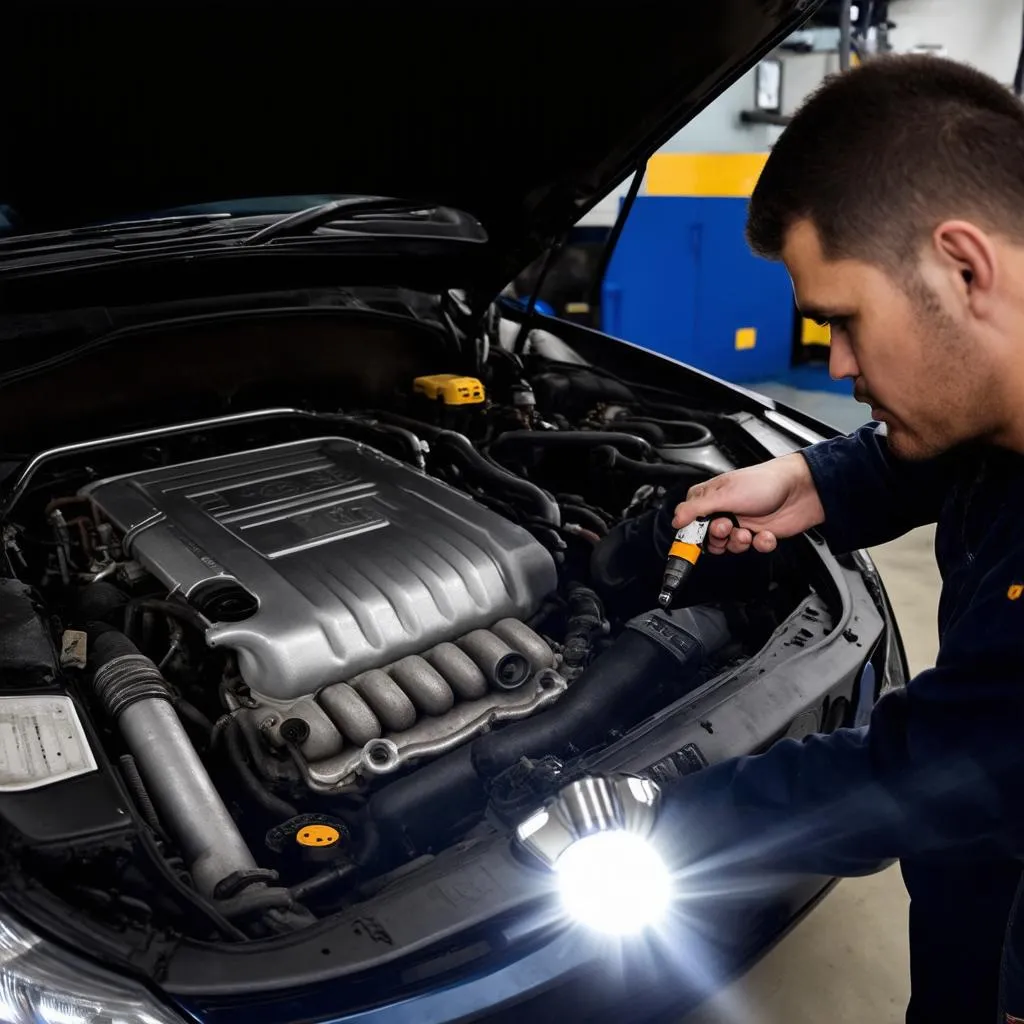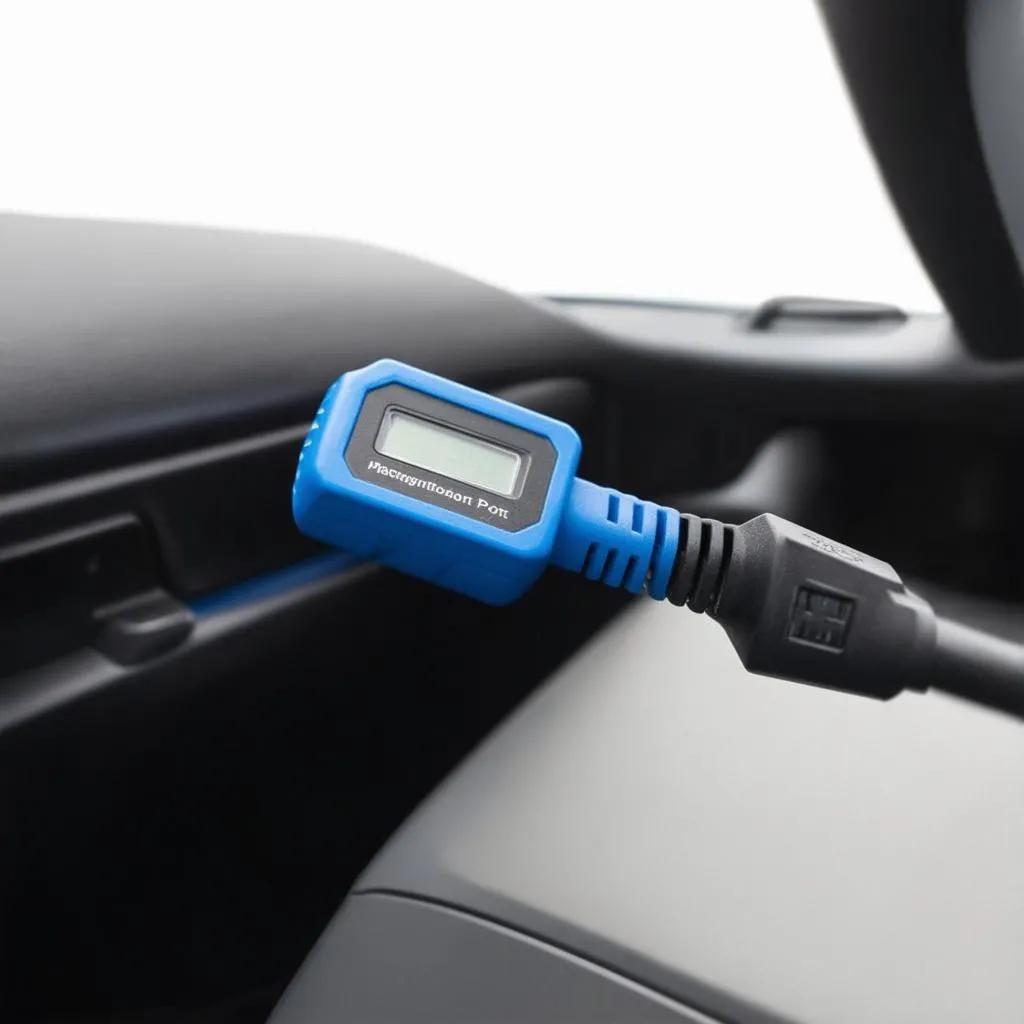Imagine this: You’re cruising down the highway, windows down, enjoying the open road in your trusty 2001 Ford Explorer V8. Suddenly, that dreaded check engine light pops up, casting a shadow over your journey. You pull over, fish out your trusty OBD-II scanner, and bam – you’re staring at the cryptic code “P0174.” Don’t worry, you’re not alone. This is a common issue for many Ford Explorer owners, and we’re here to break down what it means and how to get you back on the road.
What Does the P0174 OBD-II Code Mean?
In simple terms, the P0174 code signals a “System Too Lean (Bank 2)” problem. This means your engine is running on an air-fuel mixture that has too much air and not enough fuel. Think of it like trying to start a campfire with too much kindling and not enough logs – you’ll get a weak, inefficient burn.
But what does “Bank 2” mean? In V-shaped engines like your Explorer’s V8, there are two cylinder banks – one on each side of the engine. Bank 2 usually refers to the passenger side.
Possible Causes of a P0174 Code in a 2001 Ford Explorer V8
Several culprits could be triggering the P0174 code in your Ford Explorer. Let’s explore some of the most common ones:
- Vacuum Leaks: A leak in your intake manifold, vacuum hoses, or PCV valve can disrupt the delicate air-fuel balance, leading to a lean condition.
- Faulty Oxygen Sensor: The oxygen sensor (O2 sensor) acts like your engine’s eyes, monitoring the exhaust gases and relaying information to the engine control unit (ECU) to adjust the air-fuel mixture. A malfunctioning sensor can send incorrect data, causing the ECU to lean out the mixture unnecessarily.
- Fuel Injector Problems: A clogged or malfunctioning fuel injector on Bank 2 can restrict fuel flow to the cylinders, resulting in a lean mixture.
- Fuel Pressure Issues: Low fuel pressure, often caused by a failing fuel pump or a clogged fuel filter, can starve your engine of fuel.
- Exhaust Leaks: A leak in your exhaust manifold or exhaust system before the O2 sensor can allow unmetered air into the system, confusing the sensor and leading to a false lean reading.
Diagnosing and Fixing the P0174 Code
While the P0174 code can be intimidating, don’t panic. Here’s a systematic approach to help you identify and fix the problem:
- Check for Vacuum Leaks: Carefully inspect all vacuum hoses, the intake manifold gasket, and the PCV valve for any cracks, loose connections, or signs of deterioration. Use a carburetor cleaner spray around suspected areas while the engine is running – a change in engine speed indicates a leak.
- Inspect the Oxygen Sensor: A professional-grade OBD-II scanner can help read live data from the O2 sensor and determine if it’s functioning correctly. Replace the sensor if it’s faulty.
- Examine Fuel Injectors: Check the fuel injectors on Bank 2 for proper operation. You can use a stethoscope to listen for the characteristic “clicking” sound indicating they are firing. Cleaning or replacing faulty injectors might be necessary.
- Test Fuel Pressure: Use a fuel pressure gauge to ensure the fuel pump delivers adequate pressure. Replace the pump or filter if necessary.
- Address Exhaust Leaks: Inspect the exhaust manifold and exhaust pipes for any cracks or leaks, particularly around the welds. Repair or replace damaged components.
 Car Engine Inspection
Car Engine Inspection
Beyond the Technical: A Holistic Perspective
While diagnosing and fixing the technical aspects of the P0174 code is crucial, let’s take a moment to appreciate the holistic interplay between man and machine. Just as our bodies require balance and harmony to function optimally, so do our vehicles.
In some cultures, a car’s smooth running is believed to be influenced by positive energy and good fortune. While this might seem unrelated to a technical issue like a P0174 code, there’s a certain wisdom in ensuring your car receives proper care and attention. Regular maintenance, timely repairs, and a respectful approach towards your vehicle can contribute to its overall well-being.
Frequently Asked Questions about the P0174 Code
- Can I still drive my Ford Explorer with a P0174 code?
While you might be able to drive for a short distance, it’s not recommended. Driving with a lean air-fuel mixture can damage your catalytic converter and engine in the long run.
- How much does it cost to fix a P0174 code?
The cost of repair depends on the underlying cause. Simple fixes like replacing a vacuum hose can be inexpensive, while replacing major components like fuel pumps or oxygen sensors can be more costly.
- Is it difficult to fix a P0174 code myself?
Some fixes, like replacing vacuum hoses or a fuel filter, can be done with basic mechanical skills. However, diagnosing and repairing more complex issues like faulty sensors or fuel injectors might require the expertise of a qualified mechanic.
Related OBD-II Codes
The P0174 code often appears alongside other codes, such as:
- P0171: System Too Lean (Bank 1)
- P0101: Mass Air Flow (MAF) Sensor Performance Problem
- P0300: Random/Multiple Cylinder Misfire Detected
Vehicles Commonly Affected by the P0174 Code
While the P0174 code can affect various vehicles, it’s more common in certain models, including:
- Ford F-150
- Chevrolet Silverado
- Dodge Ram 1500
- Toyota Camry
- Honda Accord
Need Expert Help with Your 2001 Ford Explorer V8?
 Car Diagnostic Tool Plugged In
Car Diagnostic Tool Plugged In
Diagnosing and fixing car troubles can be a real head-scratcher. If you’re feeling overwhelmed by the P0174 code or any other automotive conundrum, don’t hesitate to reach out. Our team of expert mechanics is available 24/7 to provide top-notch support and guidance. Contact us on WhatsApp at +84767531508, and let us help you get your Ford Explorer back in tip-top shape.
Keep Exploring with techcarusa.com
We hope this article has shed light on the mysterious P0174 code and empowered you to take action. Remember, knowledge is power when it comes to car care. For more insightful articles, tips, and tricks on all things automotive, continue exploring techcarusa.com.